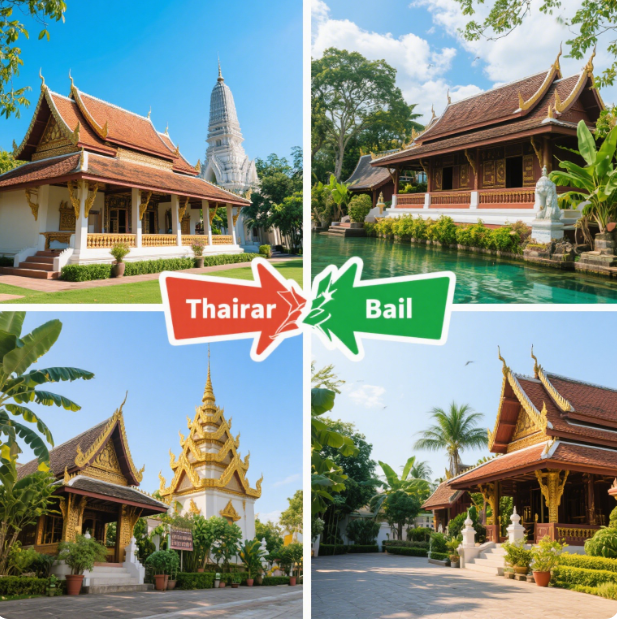In the vibrant world of digital nomadism, Chiang Mai in Thailand and Bali in Indonesia have emerged as two of the most sought – after destinations for remote developers. These tropical havens promise a blend of work – friendly environments, cultural richness, and breathtaking landscapes. But which one is the ultimate paradise for those who code on the go? As a tech professional who has spent considerable time in both places, I’m here to offer a real – world comparison that goes beyond the glossy travel brochures.
The Tech Ecosystem: A Battle of the Hubs
Chiang Mai has earned its reputation as the “Silicon Valley of Southeast Asia.” The city boasts a thriving tech ecosystem, with numerous co – working spaces, tech meetups, and startup incubators. Places like Punspace and Hubba have become iconic among remote developers. The local tech community is tight – knit and incredibly supportive, often organizing hackathons and coding workshops. This collaborative environment makes it easy to network, share ideas, and even find potential clients or co – founders.
On the other hand, Bali has a more laid – back approach to its tech scene. While it may not have as many dedicated tech – focused spaces as Chiang Mai, it compensates with a diverse range of co – working spots that offer a unique blend of beach – side relaxation and productivity. Canggu, in particular, has become a mecca for digital nomads, with places like Dojo and Outpost attracting developers from around the world. Bali also hosts its fair share of tech events, although they tend to be more sporadic compared to Chiang Mai’s regular schedule.
Cost of Living: Budgeting for the Nomadic Life
When it comes to cost – effectiveness, Chiang Mai takes the lead. Living expenses in this Thai city are relatively low, making it an ideal destination for developers on a budget. You can find comfortable apartments for rent at a fraction of the cost compared to Western cities. A delicious meal at a local eatery can cost as little as a couple of dollars, and transportation, whether by tuk – tuk or motorbike rental, is incredibly affordable.
Bali, on the other hand, has a more variable cost of living. While it’s possible to live frugally, especially if you stick to local markets and budget accommodation, the island also caters to a more upscale crowd. Beach – front villas and trendy restaurants can quickly drain your wallet. However, if you’re willing to explore the less touristy areas and embrace the local way of life, you can still manage to live comfortably without breaking the bank.
Internet Connectivity: The Lifeline of Remote Work
For remote developers, a reliable internet connection is non – negotiable. In Chiang Mai, most co – working spaces and cafes offer high – speed Wi – Fi, and it’s not uncommon to find speeds of 50 – 100 Mbps or more. Even in many residential areas, the internet is stable enough to handle video conferences and large file transfers.
Bali’s internet situation is a bit more hit – or – miss. In popular digital nomad areas like Canggu and Ubud, you’ll find plenty of places with decent connectivity. However, venture off the beaten path, and you might encounter slower speeds or frequent outages. Some developers opt to invest in a local SIM card with a data plan as a backup, especially if they plan to work from more remote locations.
Lifestyle and Culture: A Feast for the Senses
Chiang Mai offers a rich cultural experience deeply rooted in Thai traditions. From the ancient temples that dot the city to the bustling night markets filled with handicrafts and street food, there’s always something new to discover. The pace of life is relatively relaxed, and the locals are known for their warm hospitality. It’s a place where you can easily immerse yourself in the local culture while still maintaining a productive work routine.
Bali, on the other hand, is a melting pot of cultures. The island’s unique blend of Hindu traditions, surf culture, and international influences creates a vibrant and dynamic atmosphere. Whether you’re exploring the rice terraces of Ubud, catching a wave in Seminyak, or attending a traditional Balinese dance performance, there’s never a dull moment. Bali’s nightlife is also more lively compared to Chiang Mai, with beach parties and trendy clubs drawing crowds from all over the world.
In conclusion, both Chiang Mai and Bali have their own unique charm and advantages for remote developers. Chiang Mai excels in terms of its tech ecosystem, cost – effectiveness, and stable internet. Bali, on the other hand, offers a more diverse and exciting lifestyle with a laid – back approach to work. Ultimately, the choice between the two comes down to your personal preferences, work requirements, and budget. So, whether you’re drawn to the tech – savvy streets of Chiang Mai or the sun – kissed beaches of Bali, one thing is for sure: both destinations are sure to offer an unforgettable experience for the digital nomad developer.



